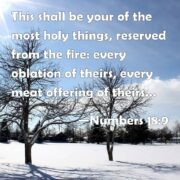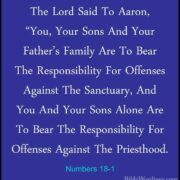Rewards for Priestly Service
The rewards for priestly service is income for their ministry. This income comes in different forms in ancient Israel, but it usually comes in cash in the present day. When pastors are blessed with cars, houses or other gifts, they are not income from the Lord, but simply gifts from the spiritual family.
In Ancient Israel, the first means of support came through the sacrificial system. The priests receives a portion of the meat from the various animals that were sacrificed as sin offerings, guilt offerings, or fellowship offerings (Num. 18:9). Part of the animal was offered as a sacrifice on the altar to the Lord, and another part was given to the priest. The same was true for the grain offerings and the wave offerings — dedication offerings — part was offered to the Lord on the altar and part given to the priest (Num. 18: 9–11).
The priests were also to receive all of the firstfruits of the land and the firstborn of the animals (Num. 18: 12–19). If the animals were holy (that is, ceremonially clean animals that were unblemished), their blood and fat would be offered as sacrifices, while the meat would belong to the priests. If the animals did not belong to a class that could be offered as sacrifices, such as donkeys or camels, the owner redeems paying the market rate for the animal plus 20% to the priest.
12 He will decide whether it is good or bad. Its value will be what he decides it will be. 13 Suppose the owner wants to buy the animal back. Then a fifth must be added to its cost. (Leviticus 27:12-13)
The same requirement of redemption was true of firstborn male babies. They were to be redeemed at the set rate of five shekels of silver, and the money in either case was paid to the priests. Different kinds of offerings and ministries became the source of income for the priests, as appointed by the Lord. It is what a part of what it means to have the Lord as their inheritance.
Your weekly dose of prophetic wisdom and anointing awaits you. Join our LIVE Conference Call!
1) Call 515-604-9266
2) Go to startmeeting.com, and use the login: BishopJordan













